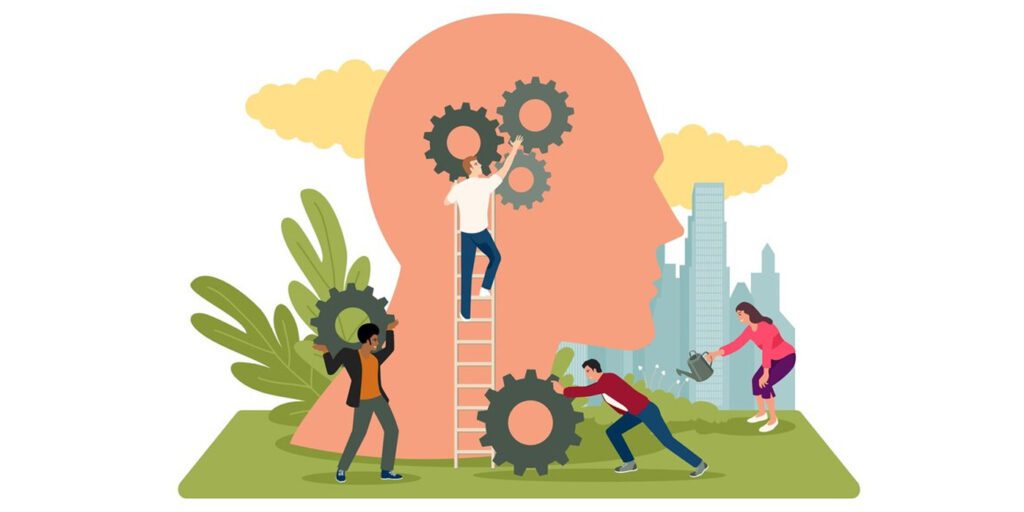9 Must -Have personality Development Skills for Success

Developing your personality entails strengthening your relationships with other people. It entails developing strong communication skills, increasing self-assurance, cognizance of others’ emotions, adaptability, and leadership abilities. In personality Development Skills You can improve your knowledge of yourself, take up new skills, and apply these abilities to grow as a person and achieve success in a variety of endeavors.
Importance of Personality Development Skills for Success
Table of Contents
ToggleBuilding a strong personality is important for success in many facets of life. It includes a variety of features, actions, and viewpoints that influence how people relate to the outside world. First of all, a strong personality encourages good communication abilities, which are essential for networking and forming relationships. Second, it strengthens leadership qualities, empowering people to motivate and motivate others to pursue shared objectives. Furthermore, a strong personality fosters adaptation and resilience, which are necessary for overcoming obstacles.

Moreover, it cultivates self-assurance and assertiveness, enabling people to confidently pursue their goals. In the end, developing a person’s character, integrity, and emotional intelligence—qualities that are essential for long-term success in both the personal and professional spheres—is what personality development is all about, not just charming appearances.
9 Must-Have Personality Development Skills for Success
Effective communication, self-assurance, a positive outlook, emotional intelligence, flexibility, leadership, time management, ongoing learning, and resilience are all necessary for personality development and success. Developing these qualities promotes both career and personal development. Hare are nine must- have skills!
- Effective Communication
- Confidence
- Positive Attitude
- Emotional Intelligence
- Flexibility
- Leadership Skills
- Time Management
- Continuous Learning
- Responding
Understanding Strengths and Weaknesses in Personality Development Skills
Strengths in personality development skills
- Finding Your Strengths
Consider the jobs or circumstances in which you shine. What is it that you are usually best at? What pursuits give you energy?
- Feedback
Consult your peers, mentors, or superiors for their opinions.
- Alignment of Passion and Skill
Determine the pursuits in which you are both talented and enthusiastic. These frequently suggest advantages.
- Excellence and Consistency
Your strengths are the things you continuously do well at. Rather than depleting you, they energize you.

Weaknesses in Personality Development Skills
- Seeing Your Weaknesses
Consider the areas in which you are weak or frequently receive unfavorable comments. Which tasks make you feel exhausted?
- Critique and Feedback
Recognize opportunities for growth by using constructive criticism to help you accept it with grace.
- Self-Reflection
Evaluate your performance and potential areas for improvement on a regular basis. For this, journaling can be beneficial.
- Possibilities for Learning
See your flaws as chances to improve. To improve your skills, seek out tools, classes, or mentors.
- Balance and development
Don’t undervalue your strengths in favor of concentrating on your shortcomings. Full growth is ensured by a balanced approach.
Strategies
- Leverage Strengths
Take advantage of any chance to apply your advantages in both personal and professional settings.
- Develop Weaknesses
Give priority to the areas where you are most vulnerable and concentrate on making little, steady improvements.
- Make Goals
To successfully address deficiencies and build on strengths, make sure your goals are SMART (specific, measurable, achievable, relevant, and time-bound).
Effective Verbal Communication in Personality Development Skills
Speaking with confidence and clarity in conveying concepts, ideas, and knowledge is essential to effective verbal communication. The following are some essential ideas to improve your verbal communication abilities:
Clarity in Personality Development Skills
When speaking, be precise and succinct. When speaking with those who might not be familiar with the subject, especially, use plain language and stay away from jargon and extremely complicated terminology.
Active Listening
Active listening involves fully engaging with the speaker, showing genuine interest, and understanding their message. Reflect on what they say, ask clarifying questions, and provide feedback, fostering mutual respect and effective communication.
Body Language
Body language, which includes posture, gestures, and facial emotions, is an essential component of communication. It expresses intentions and feelings in addition to spoken cues. Keeping an open and confident body language and making the right eye contact improves comprehension and rapport, which results in more productive interactions in a variety of social and professional contexts.
Tone of voice
Beyond the words you say, the way you talk can also convey a lot of information. Learn to preserve the tone appropriate for the talk by being aware of it. Steer clear of talking too quietly, loudly, or monotonously.
Confidence in Personality Development Skills
Talk with conviction and confidence, but try not to come across as haughty or unduly combative. Speaking with confidence can increase confidence and generate confidence in your message.
Clarity of Purpose In Personality Development Skills
When you talk, decide what you want to say. To guarantee clarity and coherence, arrange your ideas and rationally construct your message.
Practice
Like any other skill, verbal communication skills are developed through practice. To improve your skills and boost your confidence, take advantage of every chance to participate in talks, presentations, and public speaking.
Personal Relationships and Emotion
Compassion and Perception in Personality Development Skills
Social interaction, particularly in intimate partnerships, fosters empathy and comprehension in people. This entails acknowledging and expressing others’ emotions, which is crucial for clear communication and the development of wholesome relationships.
Communication Skills
Relationships offer chances to develop communication skills like straightforward self-expression, active listening, and constructive dispute resolution. These abilities are essential for interacting with other people in social settings and building deep connections.
Emotional Regulation
People learn how to control their emotions in a variety of situations through their connections. They gain the ability to control their own emotions as well as react appropriately to those of others. The capacity to control one’s emotions is necessary for both stress management and preserving healthy relationships.
Self-awareness
Many times, interpersonal encounters work as mirrors, reflecting back to us facets of ourselves that we were unaware of. People gain a better grasp of who they are, what motivates them, their strengths, and their areas for improvement through self-reflection and input from others.
Social Support
Good relationships improve general wellbeing and offer emotional support through trying times. A support system can help people feel more connected to their home, as well as increase confidence and lower stress levels.
Cultural and Social Norms
People’s views, beliefs, and behaviors are influenced by the cultural and social standards they are exposed to through relationships. Through engaging with people from varied backgrounds, people can acquire new perspectives and expand their comprehension of the world.
Confidence Building For Personality Development Skills
Positive Self-Talk
A great strategy for increasing confidence and resilience is positive self-talk. Affirmations like “I am capable,” “I am worthy,” and “I believe in myself” should take the place of negative ideas. Positive affirmations that highlight your abilities and potential can help you overcome self-doubt. Developing a positive self-talk routine can help you think more powerfully and with confidence.

Set Realistic Goals
Establishing attainable objectives is crucial to boosting self-assurance. To make bigger goals feel more attainable, break them down into smaller, more doable steps. To keep your desire and momentum going, acknowledge and appreciate every minor victory you achieve along the way. You can develop confidence in your abilities to move consistently in the direction of successful outcomes while minimizing emotions of stress or despair by setting realistic goals.
Confront Your Doubts
Building confidence requires facing your doubts head-on. Determine whatever particular uncertainties or apprehensions are impeding you and confront them head-on. Look for facts to confirm or disprove these doubts, and weigh other viewpoints. By facing your doubts head-on, you can clear your mind, get past roadblocks, and develop the confidence you need to fervently pursue your objectives.
Practice mindfulness
Engage in mindfulness exercises to develop self-awareness and lessen self-doubt. Every day, set aside some time to concentrate on the here and now without passing judgment. Observe your feelings and thoughts without becoming attached to them; instead, let them pass. Deep breathing, body scans, and other mindfulness exercises can help clear the mind and promote calmness, which can boost one’s self-assurance and resilience in the face of difficulties.
Vision and Goal Setting
Clarity of Purpose
People have a sense of purpose and direction when they have a clear vision. It aids in their understanding of their goals in life, which is crucial for forming their personalities.
Motivation
Vision-based goals are strong sources of motivation. People are more likely to remain motivated and focused on achieving their goals when they have a clear understanding of what they want to accomplish. This, in turn, has a beneficial effect on their personality.
Concentration and Setting Goals
Choosing resources and efforts becomes easier for people when they set goals based on a vision. By concentrating on their core values, individuals can direct their attention toward pursuits that support their long-term goals and foster personal development.
Self-Reflection and Adaptation
Reviewing goals’ progress on a regular basis enables people to evaluate their activities, assets, and opportunities for development. Because they are self-aware, they can modify their tactics and actions as necessary, which promotes ongoing personal growth and strengthens their unique personality qualities.
Flexibility in personality development Skills
Flexibility in Changing Situations
Complementing adaptability, flexibility is the capacity to modify goals, schedules, and courses of action in response to changing conditions. When it comes to personality development, flexibility enables people to easily negotiate ambiguity and uncertainty, which helps them stay resilient and goal-focused in the face of unforeseen obstacles or setbacks. People who are more flexible tend to be more versatile and adaptable, which improves their overall efficacy and success in a variety of spheres of life.
Resilience and Problem-Solving
The ability to solve problems is essential to personality development because it allows people to overcome obstacles and accomplish their objectives. Strong problem-solvers are able to assess difficult situations, pinpoint underlying issues, and create workable solutions to overcome challenges.
People may improve their critical thinking, creativity, and decision-making skills—all of which are crucial for success in both their personal and professional lives—by developing their problem-solving talents. Additionally, problem-solving encourages a proactive outlook on life, enabling people to take charge, resolve issues, and grasp chances for advancement.
What Are the Benefits of Effective Time Management?
- Improved Productivity
People who are more adept at managing their time may complete more things in less time, which boosts productivity and gives them a stronger sense of accomplishment.
- Enhanced Focus and Concentration
By helping people set out particular timeslots for each task, time management improves performance by enabling them to concentrate on one task at a time without interruptions.

- Increased Self-Discipline
Effective time management calls for self-control as well as the capacity to adhere to plans and deadlines. Developing these skills through time management will help you succeed in many facets of life and have more self-control.
- Improved Work-Life Balance
Time management skills enable people to schedule personal, recreational, and work-related activities in addition to leisure activities. General happiness or well-being is influenced by this equilibrium.
